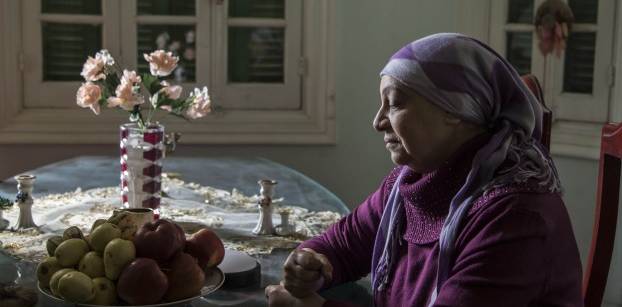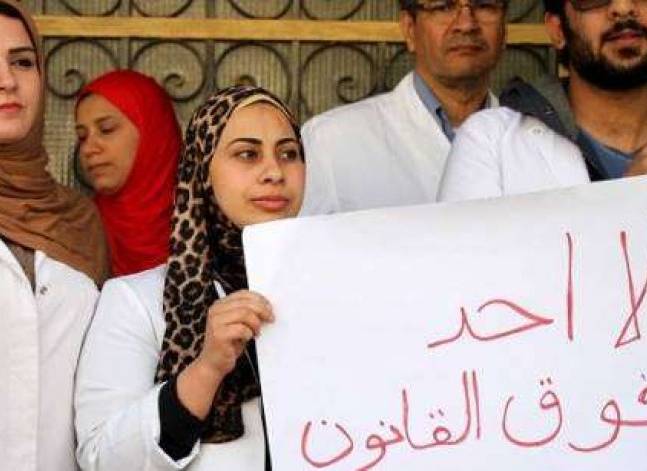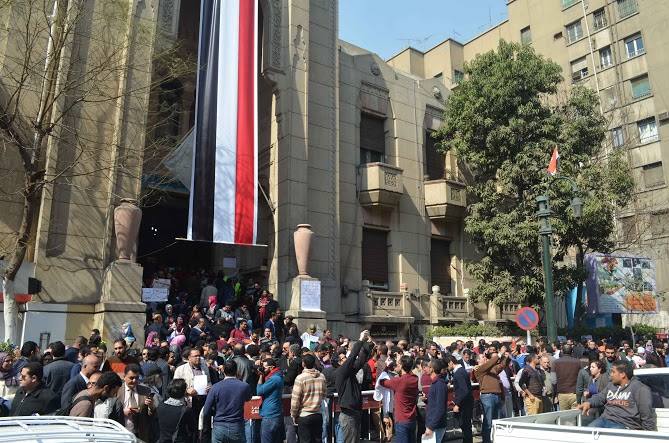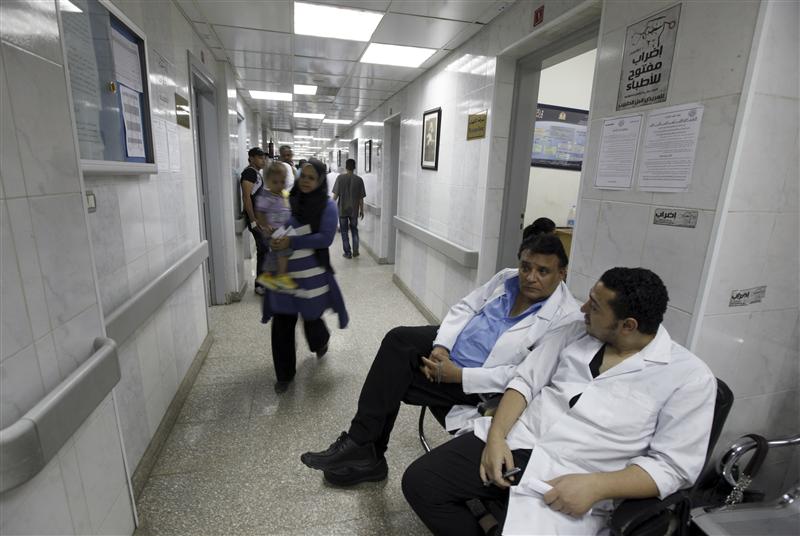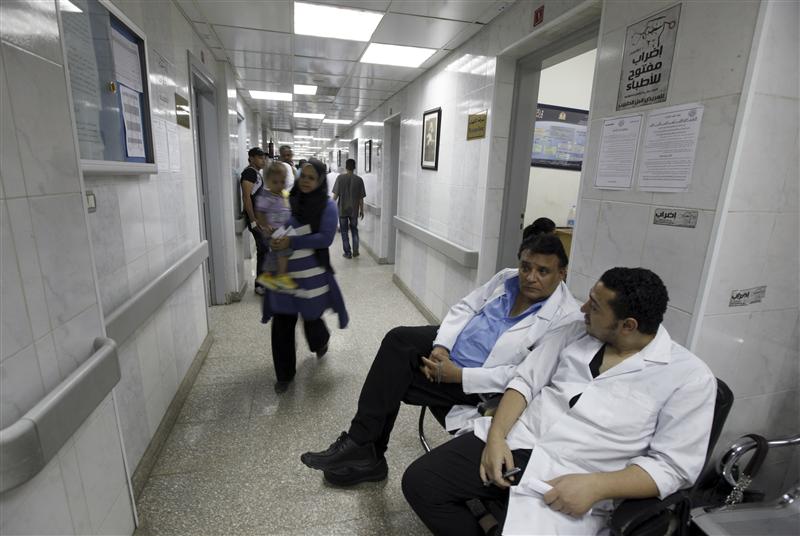Latest NEWS
- Aswat Masriya, the last word
- Roundup of Egypt's press headlines on March 15, 2017
- Roundup of Egypt's press headlines on March 14, 2017
- Former Egyptian President Hosni Mubarak to be released: lawyer
- Roundup of Egypt's press headlines on March 13, 2017
- Egypt's capital set to grow by half a million in 2017
- Egypt's wheat reserves to double with start of harvest -supply min
- Roundup of Egypt's press headlines on March 12, 2017
'Clinical Trials': sanctuary for those unable to cover their medical expenses in Egypt (Part 1*)
CAIRO, Jul 13 (Aswat Masriya) - Sabah is a woman in her sixties who knew about her disease six years ago. Despite her pain, her face is always smiling. Discovering her illness, Sabah’s suffering began as she doesn’t have medical insurance, which is why she sought state-funded treatment.
When the tumor extended from the breast to the brain and lungs, Sabah found the solution to get free treatment and medicine; joining a clinical trial for a new medicine that hasn’t yet been put on the market. The drug was tested to measure its side effects and effectiveness, which increased Sabah’s enthusiasm especially after knowing that the treatment covers the follow ups, the X-rays and labs.
"I graduated from the section of Petroleum, Faculty of Engineering. I worked in one of the famous private schools and I was paid a handsome salary. Thus, I didn't care at the time to obtain health insurance, as this is the case of working in the private sector. I used to teach mathematics and Christian Religion."
In 2004, Sabah sustained a severe blow to her breast which caused hemorrhage and puss. The surgeon told her that she needed a surgery to clean the wound and to remove the lumps. In 2010, after the development of a large tumor, Sabah had to be operated on after having received approval for state-funded treatment. Another approval for treatment was obtained so that she could receive chemotherapy.
In 2012, she suffered from a severe cough, doctors didn’t know the real reason behind it. Then it was discovered that the cancer tumor has attacked the lungs, and she was offered to participate in a clinical trial to test the effectiveness of a new free drug to which she immediately consented.
Sabah, is one among thousands of patients in Egypt who go through clinical trials testing new drugs. These are legal trials conducted under the supervision of the Ministry of Health, and run in educational hospitals according to a specific legal framework under the auspices of the ethics committees of scientific research in research institutions. However, the official information available concerning these trials is so few, barely known at all.
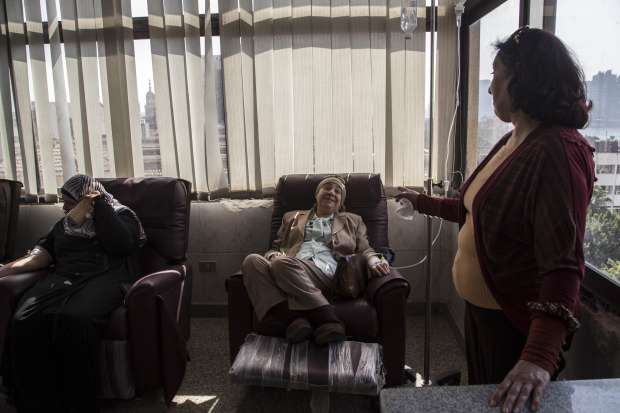
Sabah and her neighbour Wedad. Photography by Roger Anis
According to the National Health Institution database published on clinicaltrials.gov website, Egypt is considered the second African country, after South Africa, that invites foreign pharmaceutical companies to run clinical trials. The website includes all the clinical trials run all over the world, specifying the places of each trial, the day it started and ended, and the names of the research team that participated in it.
This investigation pursues the clinical trials testing cancer-related drugs with the disease witnessing a rapid incensement in Egypt. Breast cancer is the most common among women, while Egypt is listed fourth globally in liver cancer rates. This investigation also highlights clinical trials for liver diseases, especially as Egypt ranks first in the liver virus infection in the world. In Egypt, hepatitis C is from the fourth and sixth generation, unlike the rest of the world.
What are the Clinical Trials and how are they conducted?
Dr. Wafaa Abdelaal, head of the clinical trials at the National Centre for Research, identifies the concept of the clinical trials as "studies run to evaluate the efficiency and safety of any drug or medicine before applying it on a large scale."
Concerning the committees, Dr. Abdelaal said that there are certain rules governing those committees, one of them is that they should have a president, a vice president and rapporteur. There should be between 9 and 15 members, including doctors and scholars specialized in research ethics among them a member with non-scientific experience and another independent of the institution. Their membership has to be renewable.
Dr. Hany Selim, who is in charge of the Egyptian Network of Research Ethics Committees (ENREC), stated that the network was established in 2008 as a non-governmental organization under the auspices of the Egyptian Society for Healthcare Development (ESHD). The main goal is for the network to be the reference and supporter of Egyptian research ethics committees (RECs).
Dr. Magdi al-Sairafi, director of the National Liver Institute (LI) and member of the Supreme Committee for Hepatic Viruses, clarified that there are two types of clinical trials currently conducted in the LI. "The first type is when an international pharmaceutical company is the sponsor of the trial, in which case the trial is conducted according to international standards followed in western countries; the second type is linked to domestic trials conducted according to common regulations established and updated by RECs," according to al-Sairafi.
Dr. Imam Waked, Director of the Clinical Research Unit at Menoufia LI, maintained that foreign pharmaceutical companies are compliant with the instructions of the Ministry of Health (MoH). Trial drugs enter Egypt upon the approval of the MoH, and cannot be imported prior to this approval.
Dr. Hamdy Abdul Azim, Oncologist, and former head of the Department of Oncology in the Faculty of Medicine, Cairo University, indicated that the suspicion towards clinical trials is ungrounded. Trials of drugs undergo stages starting with animals to ensure the non-toxicity of the drug. Moreover, comparative experiments are conducted to compare and contrast traditional and new drugs and ensure whether efficacy and safety of the new drug are better or equal to the traditional one.
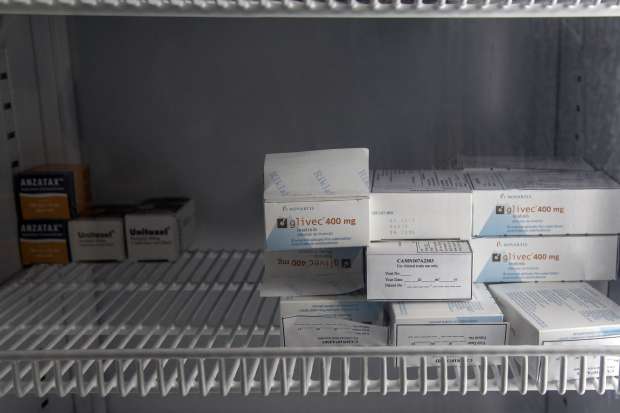
Trial drugs
Speaking about RECs, Dr. Yasser Abdul Qader, professor of Oncology and Director of Clinical Research Unit, Dept. of Oncology at Kasr el-Eini, said that the membership should include youth. "It is impossible to have among the members the professor who read my masters and doctoral theses, and I am now in my sixties." He also pointed to the fact that in Europe there are heads of departments and scientists while they are still in their thirties.
Current Legislation
Information regarding legislation was clarified by Dr. Doaa Abu Taleb, a legal researcher and professor at the Faculty of Law, Ain Shams University (ASU).
According to the study conducted by Abu Taleb, there is no legislation issued clearly and explicitly regulating clinical trials. However, there are some provisions that address certain cases, which – incidentally – include provisions on trials conducted on humans.
Article 60 of the Egyptian Constitution states, "The human body is inviolable. Any assault, defilement or mutilation thereof is a crime punishable by law. Organ trafficking is forbidden, and no medical or scientific experiment may be performed thereon without the documented free consent of the subject, according to the established principles of the medical field as regulated by law." However, the draft law has not been enacted yet.
Among the examples of laws addressing the idea of clinical trials is Article 36 of Law 71/2009 concerning psychiatric patients. This article regulates all rights for this type of patient. Paragraphs 7 and 8 provide for the following: "The approval of REC must be obtained prior to any clinical research"; "In the case of approving to be subject to scientific research and trials, the patient shall receive a full explanation of the goal of the experiment. However, it is prohibited to conduct trials on patients’ subject to mandatory admission and treatment."
There are also provisions in administrative decisions issued by the Minister of Health regulating some aspects of clinical trials such as the Egyptian Medical Code of Conduct; ministerial decree no.238/2003. In part IV of this Code, a set of instructions is issued to doctors in case of being assigned clinical trials on humans. Naturally, such instructions are not binding and do not comprise full regulation or stipulation of rights of persons subject to such trials.
Performing clinical trials without prior consent of the patient
Dr. Abu Taleb has clarified that there is no legislation criminalising clinical trials without the consent of subjects of such trials. Due to the lack of legal regulation, practitioners resort to general regulations. In fact, enforcement of general regulations in the case of conducting clinical trials without consent of subjects leads to civil and criminal liability of those responsible for the trial.
The subject of the trial in such cases is entitled to file for compensation for the damage sustained, which implies the civil liability of those conducting the trial.
We couldn’t find any cases filed by patients subjected to a clinical trial without their prior consent, except for a single criminal proceeding on February 11th, 1973. The doctor was found guilty for performing an innovative surgery on the patients both eyes causing blindness in both eyes. The doctor was supposed to perform a surgery in one eye only.
Supervising the trials
Dr. Abu Taleb has clarified that the supervision and control over clinical trials is the responsibility of administrative agencies – to be identified by the law – which should exercise the mandates thereof under the auspices of MoH. Such administrative agencies shall permit research centers to establish RECs internally to review protocols or trial projects prior to presentation to competent administrative bodies for approval. Internal RECs shall also be responsible for auditing and monitoring trials during their various stages.
Dr. Abu Taleb conducted a comparative study of legislative conditions in Egypt and the UK. According to the study the following was observed: the existence of a law regulating clinical trials shall have a positive impact on scientific research in Egypt, and shall offer sufficient protection both to researchers and subjects alike.
The 'Patients' Broker'
"The Patients' Broker" is the title of the profession well known to medical students and professors at different colleges in Egypt. Despite being an illegal profession, the law doesn’t pursue those who practice it; simply, the Patients’ Broker is someone who brings patients for medical students so they can run some tests on them and get their academic degrees, the broker or middleman receives a certain sum of money from the students in return, and share it with the patients after convincing them to consent on letting the medical students use them as test subjects.
We decided to contact one of the most famous patients’ brokers in old Manial area facing Kasr El-Aini Educational Hospital. We managed to do this only after claiming a false name and address, we also claimed that we wanted to run an experiment testing a new drug produced by one of the major pharmaceutical companies and we need a patient to consent on trying this drug, on the condition that they won’t sign the Informed Consent Form.
During the interview, Sulayman (pseudonym) asked so many questions about the therapeutic dose and if this drug is safe to test on the patient and we offered him one thousand pounds for every patient he brings us.
Then Sulayman started to talk about a clinical trial conducted by a doctor about a year ago, it was a drug the doctor prepared himself and wanted to test its effect on patients.
On the second interview the money was raised to be 2000 pounds for every patient, and the broker asked to see the documents for the initial experiments on the drug.
*This is part one of a three-part series on clinical trials in Egypt.

